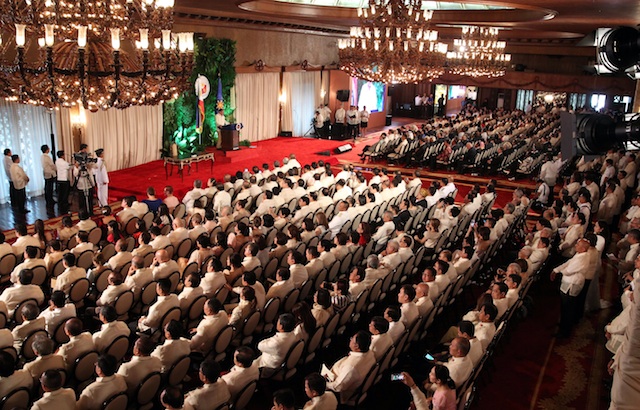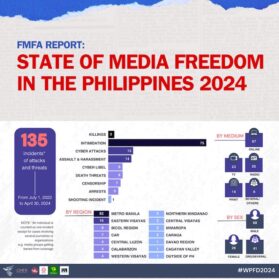DAVAO CITY (MindaNews / 30 June) – Moro and militant groups on Thursday welcomed President Rodrigo Duterte’s vow to “implement all signed peace agreements in step with constitutional and legal reforms.”
The first Mindanawon President said he was “elated” by the “expression of unity among our Moro brothers and leaders, and the response of everyone else to my call for peace.”
He said he is looking forward to the participation of all stakeholders, “particularly our indigenous peoples to ensure inclusivity in the peace process.”
 President Rodrigo Duterte delivers his inaugural address in Rizal Hall, Malacnang Palace on Thursday, June 30. Duterte is the country’s 16th President and the first Mindanawon head of state. Photo courtesy of the Malacanang News and Infromation Bureau
President Rodrigo Duterte delivers his inaugural address in Rizal Hall, Malacnang Palace on Thursday, June 30. Duterte is the country’s 16th President and the first Mindanawon head of state. Photo courtesy of the Malacanang News and Infromation Bureau
“That is the best decision to end the decades old uncertainties in Mindanao,” Muslim Sema, chair of one of the factions of the Moro National Liberation Front (MNLF) said.
As a Presidential candidate, Duterte had repeatedly vowed to honor peace agreements, correct the historical injustices committed against the Bangsamoro people and resume peace negotiations with the National Democratic Front (NDF).
On the Bangsamoro peace process, the Philippine government and the MNLF signed the Tripoli Agreement of 1976 and the Final Peace Agreement (FPA) in 1996. The government and the Moro Islamic Liberation Front (MILF) on the other hand signed the 2012 Framework Agreement on the Bangsamoro (FAB) and the 2014 Comprehensive Agreement on the Bangsamoro (CAB).
The FPA has not been fully implemented, while the CAB’s implementation got delayed by the non-passage of the Bangsamoro Basic Law (BBL). Its passage would have paved the way for the creation of the Bangsamoro, a new autonomous political entity that would replace the Autonomous Region in Muslim Mindanao (ARMM).
“Settling the Moro Question before anything is the key to national and regional security and stability. It is also the key to fostering national brotherhood and solidarity of Filipinos and Bangsamoro,” the Cotabato-City based Sema told MindaNews in a text message.
A day before Duterte’s inauguration, the MNLF under Sema and the Moro Islamic Liberation Front (MILF) under Al Haj Murad Ebrahim, agreed to “organize a Joint Technical Working Group tasked to “finding common ground” between the 1996 FPA with the MNLF and the 2014 CAB with the MILF, to harmonize the peace tracks.
Murad led a delegation that met with Duterte on June 17 in Davao City, in the company of Abulkhayr Alonto, chair of another MNFL faction. Murad and Duterte had a 20-minute talk on the peace roadmap.
Presidential Adviser on the Peace Process Jesus Dureza had earlier told MindaNews that the Bangsamoro peace roadmap of the Duterte administration would be “inclusive of all Moro fronts” and that unresolved issues of the MNLF’s FPA and the provisions of the MILF’s CAB may be merged and consolidated so they can be “harmonized and only one law will come out of it.”
The Duterte administration is pushing for a shift to a federal form of government and questions have been raised if the Bangsamoro Basic Law (BBL) which Congress under the Aquino administration, failed to pass, will be passed ahead of the proposed federalism law. Earlier, presumptive Speaker Pantaleon Alvarez, Jr., said there was no need for a BBL because of the shift to federalism.
The passage of the BBL, however, is a commitment under the CAB.
Consistent
Guiamel Alim, a member of the Council of Elders of the Consortium of Bangsamoro Civil Society (CBCS) said Duterte’s commitment to implement all signed peace agreements is “consistent with this campaign promises.”
Amina Rasul, President of the Philippine Center for Islam and Democracy (PCID) said they welcome Duterte’ commitment, as well as the reference to unity between the MILF and the MNLF and the participation Indigenous Peoples and all other stakeholders/
Lawyer Maria Asis of the Bangsamoro Study Group found Duterte’s pronouncement “reassuring.”
“The caveat that it will be ‘in step with constitutional and legal reforms’ and not simply ‘consistent with Constitution, etc..’ provides a wider space for the entrenchment of the CAB but it was still couched in general terms, so basically, wait-and-see as to details and as to how this will play out.”
Drieza Liningding, Secretary-General of the Bangsamoro National Movement for Peace and Development and co-founder of the militant youth organization, Free The Bangsamoro Movement, said they are “assured of continuity of the gains (of the peae process) and not renegotiation as many fear.”
But Liningding said they are “a bit concerned when he made Constitutionality as requirement.”
“It could have been more assuring if he made mention of Charter Change or Federalism. But let’s give him the benefit of the doubt. We’ve known him as a man who honors his promise. He promised peace and to correct injustices against the Bangsamoro people . Let’s help him whichever way we can to realize his commitment to us.”
Naguib Sinarimbo, also of the Bangsamoro Study Group lauded Duterte’s reiteration of his commitment to the Bangsamoro by implementing signed agreements “and in step with legal reforms which puts squarely into the agenda the long-standing stumbling block in the implementation of earlier peace agreements — the Constitution. A reform of the legal framework would hopefully result in the full implementation of peace agreements and pave the way for a peaceful and legal resolution of the Bangsamoro Question.”
GPH-NDF
Former Gabriela partylist Represnetative Luz Ilagan told MindaNews that while there was no specific reference to the GPH-NDF talks in Duterte’s inaugural speech, “actions speak louder than words.”
“Kulang sa speech pero may nagawa na” (It’s not in the speech but so much has been done), she said.
Bayan Muna Rep. Carlos Isagani Zarate agreed that while it was not specifically stated, “it is reassuring enough that he said he is ‘committed to implement all signed peace agreements in step with constitutional and legal reforms.’
Zarate said Duterte’s policy is a departure from his predecessor, Benigno Simeon Aquino III, “who unilaterally abandoned the 1992 GRP-NDFP Hague Joint Declaration, which contained the agenda for the peace talks, claiming it as a ‘document for perpetual division.’”
As presumptive President and later as President-elect, Duterte met with NDF peace panel spokesperson Fidel Agcaoili and sent a delegation to Oslo in Norway to meet with NDF peace panel chair Luis Jalandoni and chief political consultant Jose Ma. Sison, Duterte’s professor in Political Thought at the Lyceum of the Philippines University.
The June 14-15 talks yielded positive results with both parties agreeing to begin the first round of talks under the Duterte administration on the third week of July.
The parties agreed on a five-point agenda for the July talks, including the affirmation of previously signed agreements. (Carolyn O. Arguillas / MindaNews)
